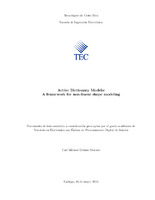Mostrar el registro sencillo del ítem
Active dictionary models: A framework for non-linear shape modeling
| dc.contributor.advisor | Alvarado-Moya, Pablo | es |
| dc.contributor.author | Grüner-Monzón, Carl Michael | |
| dc.date.accessioned | 2017-06-01T20:41:43Z | |
| dc.date.available | 2017-06-01T20:41:43Z | |
| dc.date.issued | 2015 | |
| dc.identifier.uri | https://hdl.handle.net/2238/7133 | |
| dc.description | Proyecto de Graduación (Maestría en Electrónica) Instituto Tecnológico de Costa Rica, Escuela de Ingeniería Electrónica, 2015. | es |
| dc.description.abstract | Shape modeling has applications in science and industry fields. The existing algorithms are based on linear methods and on unimodal normal distributions not appropriate to model deformations present in natural signals. This work presents a novel shape model based on dictionary learning which is capable of representing these deformations. First a dictionary is trained through K-SVD and OMP. Then it is used as a model to represent shapes using a sparse weighting vector. The denoising properties of the model are shown for additive noise, but with the limitation that it can also represent invalid shapes. Afterwards, in order to compensate for the dictionary model limitation, a non-linear denoising method is developed based on orthogonal manifold projections. This extension ensures that the output is always a valid shape. Finally the complete iterative algorithm is presented. In this stage, the application o↵ers an initial approximation of the shape to segment. The shape is modeled using the dictionary and projected to the manifold whereby a valid shape is ensured. This process is repeated until an established convergence criteria is met. It is shown how the proposed method is capable of modeling both linear and non-linear deformations with high success. | es |
| dc.language.iso | spa | es |
| dc.publisher | Instituto Tecnológico de Costa Rica | es |
| dc.rights | acceso abierto | es |
| dc.subject | Modelado | es |
| dc.subject | Algoritmos | es |
| dc.subject | Óptica no lineal | es |
| dc.title | Active dictionary models: A framework for non-linear shape modeling | es |
| dc.type | tesis de maestría | es |


